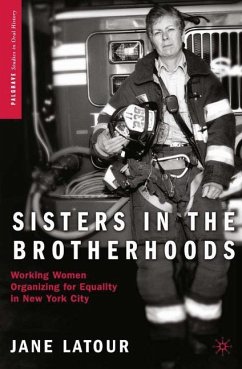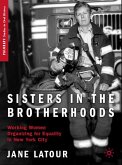Sisters in the Brotherhoods is an oral-history-based study of women who have, against considerable odds, broken the gender barrier to blue-collar employment in various trades in New York City beginning in the 1970s. It is a story of the fight against deeply ingrained cultural assumptions about what constitutes women's work, the middle-class bias of feminism, the daily grinding sexism of male co-workers, and the institutionalised discrimination of employers and unions. It is also the story of some gutsy women who, seeking the material rewards and personal satisfactions of skilled manual labour, have struggled to make a place for themselves among New York City's construction workers, stationary engineers, firefighters, electronic technicians, plumbers, and transit workers. Each story contributes to an important unifying theme: the way women confronted the enormous sexism embedded in union culture and developed new organisational forms to support their struggles, including and especially the United Tradeswomen.
"Sisters in the Brotherhoods is one of the most exciting books that I've read in years. It is nothing less than a history of the late twentieth century movement of women into non-traditional jobs as recalled by and through the voices of the women who opened the doors. Jane Latour seamlessly melds the aspirations, experiences, doubts and achievements of the courageous women who earned their livings in trades reserved for men into a persuasive analysis of generational change. Every young woman should read this resonant and moving book." - Alice Kessler-Harris, author of In Pursuit of Equity: Women, Men, and the Quest for Economic Citizenship in Twentieth Century America "Jane LaTour's book Sisters in the Brotherhoods: Working Women Organizing for Equality in New York City is a great reminder that when we have equal opportunities in every line of work we thrive. When women change the way work is done, they make lasting change in the culture of the workplace." - Billie Jean King "Jane LaTour tells the history of the tradeswomen movement by focusing on events in New York City. She captures the real lives of tradeswomen through stories that are poignant, raw, and uplifting. It brought back to me the frustration of trying to engage the Women's Movement in seeing tradeswomen as more than role models for our daughters. In our sex-segregated economy tradeswomen are on the front line in the battle for economic justice." - Dale McCormick, the first woman to complete the carpentry apprenticeship with the International Brotherhood of Carpenters and Joiners, Local 1260 in Iowa City, in 1975
"In Sisters in the Brotherhoods, Jane LaTour draws on extensive interviews and oral histories with women who broke into the building trades in New York City over the last several decades. The interviews are enormously rich sources, filled with stunning stories of male resistance, abuse, and hostility toward the integration of women and equally stirring tales of women's determination to survive this treatment. Even as they were subjected to various hair-raising and harrowing forms of harassment and intimidation, the women whose oral histories form the heart of this compelling and moving book sought to challenge and reform the system. Reform could be incredibly hard and scary work; it took one woman fourteen years to find the courage to speak at her own local. But they did speak out and by their individual and collective efforts, they organized women and sympathetic men and empowered them to fight for their rights. Sisters in the Brotherhoods illuminates an aspect of women's and labor history that has been understudied and overlooked. In the women's challenge to existing union arrangements and their own deployment of labor movement principles and practices to achieve their ends lies a fundamental contradiction of post-World War II labor history. Jane LaTour's book compels a reassessment and revision of the view of post-World War II unions as inimical to working women's interests and as vehicles for conservatism rather than progressive change." - Nancy Gabin, Department of History, Purdue University "Sisters in the Brotherhoods profiles the indomitable women who fought their way into some of the best-defended male monopolies in the U.S. labor force: the skilled trades of New York City. Jane Latour's engaging oral histories reveal the diverse routes women traveled to claim these jobs, the alliances that sustained them, and the strategies they developed to master their crafts in the face of employer hostility, co-worker harassment, union corruption, and a government that all but abandoned them in the 1980s. Tradeswomen, feminists, labor and civil rights activists, historians, and social scientists will all find wisdom and inspiration in these pages."
- Nancy MacLean, author of Freedom Is Not Enough: The Opening of the American Workplace and The American Women's Movement, 1945-2000: A Brief History with Documents "LaTour rips aside the bromides of superficial victories to explore the punishing ordeals of female pioneers in male dominated industries . . . What makes the interviews so compelling is the author's own on-the-job experience in a series of blue collar occupations and academic positions. The camaraderie makes her questions harder in substance by more sensitive in the asking." - Scott Molloy, Ph.D., Schmidt Labor Research Center, University of Rhode Island "This is a bitter tale of courage, told for the first time. In thewords of the women themselves, we hear the gut-wrenching experiences of pioneers who toughed their way into apprenticeships and on to strenuous blue-collar jobs that civil rights laws in the 1970s were designed to open to them. These women, mostly without allies, learned a cruel lesson: you could fight to cling to the job that would support a family, but you could not at the same time fight the hostility of the shop steward, the connivance of the union with the contractor. Women on the job, they learned, were viewed as an affront to the masculinity of their fellows: supporting a family was men's work. They have told their colleague Jane LaTour, often reluctantly, the details of their daily struggle. What we see about us today underlines the painful truth of this book: unions built by fathers and sons would make no space for mothers and daughters. This is an important part of a lost history." - Betsy Wade, former president, Local 3, The Newspaper Guild of New York; named plaintiff, Boylan v. New York Times, 74 CIV. 4891
"In Sisters in the Brotherhoods, Jane LaTour draws on extensive interviews and oral histories with women who broke into the building trades in New York City over the last several decades. The interviews are enormously rich sources, filled with stunning stories of male resistance, abuse, and hostility toward the integration of women and equally stirring tales of women's determination to survive this treatment. Even as they were subjected to various hair-raising and harrowing forms of harassment and intimidation, the women whose oral histories form the heart of this compelling and moving book sought to challenge and reform the system. Reform could be incredibly hard and scary work; it took one woman fourteen years to find the courage to speak at her own local. But they did speak out and by their individual and collective efforts, they organized women and sympathetic men and empowered them to fight for their rights. Sisters in the Brotherhoods illuminates an aspect of women's and labor history that has been understudied and overlooked. In the women's challenge to existing union arrangements and their own deployment of labor movement principles and practices to achieve their ends lies a fundamental contradiction of post-World War II labor history. Jane LaTour's book compels a reassessment and revision of the view of post-World War II unions as inimical to working women's interests and as vehicles for conservatism rather than progressive change." - Nancy Gabin, Department of History, Purdue University "Sisters in the Brotherhoods profiles the indomitable women who fought their way into some of the best-defended male monopolies in the U.S. labor force: the skilled trades of New York City. Jane Latour's engaging oral histories reveal the diverse routes women traveled to claim these jobs, the alliances that sustained them, and the strategies they developed to master their crafts in the face of employer hostility, co-worker harassment, union corruption, and a government that all but abandoned them in the 1980s. Tradeswomen, feminists, labor and civil rights activists, historians, and social scientists will all find wisdom and inspiration in these pages."
- Nancy MacLean, author of Freedom Is Not Enough: The Opening of the American Workplace and The American Women's Movement, 1945-2000: A Brief History with Documents "LaTour rips aside the bromides of superficial victories to explore the punishing ordeals of female pioneers in male dominated industries . . . What makes the interviews so compelling is the author's own on-the-job experience in a series of blue collar occupations and academic positions. The camaraderie makes her questions harder in substance by more sensitive in the asking." - Scott Molloy, Ph.D., Schmidt Labor Research Center, University of Rhode Island "This is a bitter tale of courage, told for the first time. In thewords of the women themselves, we hear the gut-wrenching experiences of pioneers who toughed their way into apprenticeships and on to strenuous blue-collar jobs that civil rights laws in the 1970s were designed to open to them. These women, mostly without allies, learned a cruel lesson: you could fight to cling to the job that would support a family, but you could not at the same time fight the hostility of the shop steward, the connivance of the union with the contractor. Women on the job, they learned, were viewed as an affront to the masculinity of their fellows: supporting a family was men's work. They have told their colleague Jane LaTour, often reluctantly, the details of their daily struggle. What we see about us today underlines the painful truth of this book: unions built by fathers and sons would make no space for mothers and daughters. This is an important part of a lost history." - Betsy Wade, former president, Local 3, The Newspaper Guild of New York; named plaintiff, Boylan v. New York Times, 74 CIV. 4891








